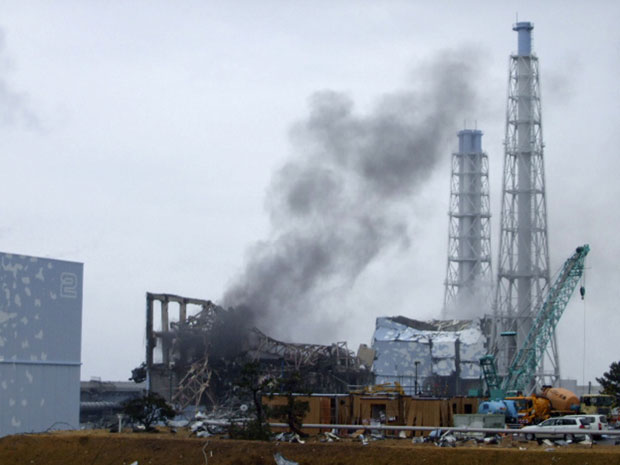Tokyo (National Post): Firefighters postponed spraying Japan’s badly damaged nuclear reactor No. 3 with seawater on Monday after a plume of grey smoke was seen over the structure, the government said.
Smoke began to rise from the plant’s No.2 and No.3 reactors on Monday, just as authorities had begun to show signs of progress in its efforts to avert nuclear disaster at the site. Japan’s nuclear safety agency later said the smoke had stopped rising over the reactor.
The plant operator said it did know what caused the smoke.

Smoke is seen coming from the area of the No. 3 reactor of the Fukushima Daiichi nuclear power plant in Tomioka, Fukushima Prefecture in northeastern Japan (Photo: Reuters)
The March 11 earthquake and tsunami left more than 21,000 people dead or missing and will cost an already beleaguered economy some US$250-million, making it the world’s costliest ever natural disaster.
News of progress at the nuclear plant was overshadowed by mounting concern that radioactive particles already released into the atmosphere have contaminated food and water supplies.
“Quite clearly it’s a serious situation,” Peter Cordingley, Manila-based spokesman for the World Health Organisation’s (WHO) regional office for the Western Pacific, told Reuters in a telephone interview.
“It’s a lot more serious than anybody thought in the early days when we thought that this kind of problem can be limited to 20 to 30 kilometres … It’s safe to suppose that some contaminated produce got out of the contamination zone.”
However, he said there was no evidence of contaminated food from Fukushima reaching other countries.
Japan’s health ministry has urged some residents near the plant to stop drinking tap water after high levels of radioactive iodine were detected.
Cases of contaminated vegetables and milk have already stoked anxiety despite assurances from officials that the levels are not dangerous. The government has prohibited the sale of raw milk from Fukushima prefecture and spinach from a nearby area.
There were no major reports of contaminated food in Tokyo, a city of about 13 million people. City officials however said higher-than-standard levels of iodine were found in an edible form of chrysanthemum.
“From reports I haveheard so far, it seemsthat thelevels ofradioactiveiodine and caesiumin milk and some foodstuffs aresignificantlyhigher than government limits,” said Jim Smith, a specialist in earth and environmental sciences at Britain’s Portsmouth University.
“This doesn’t mean thatconsumption of these products is necessarily animmediate threat, as limits are set so that food stuffs can be safely consumedover a fairly long period of time. Nevertheless, for foodstuffs which are found to be above limits, bans on sale and consumption will have to be put in place in the affected areas.”
Japan is a net importer of food, but has substantial exports — mainly fruit, vegetables, dairy products and seafood — with its biggest markets in Hong Kong, China and the United States.
China would monitor food imported from Japan, the Xinhua news agency said, citing the country’s quality control watchdog. South Korea said it would expand inspections for radioactivity to processed and dried agricultural Japanese food, from just fresh produce.
The prospects of a nuclear power plant meltdown in the world’s third-biggest economy and its key position in global supply chains rattled investors worldwide last week and prompted rare joint currency intervention by the G7 group of rich nations to stabilise markets.
Moody’s Investors Service said in a report that the downside risks from the crisis had increased over the past week for the economy, sovereign credit, banking, insurance and non-financial corporate sectors.
Tokyo’s markets were closed for a holiday on Monday. The Nikkei index shed 10% last week, wiping US$350 billion off market capitalisation, and at one point had lost as much as 20% in value.
In a much-needed boost for the battered market, billionaire investor Warren Buffett said the earthquake and tsunami were an “enormous blow” but should not prompt the selling of Japanese shares. Instead, he called events a “buying opportunity.”
“It will take some time to rebuild. But it will not change the economic future of Japan. If I owned Japanese stocks, I would certainly not be selling them,” Mr. Buffett said during a visit to a South Korean factory run by a company that is owned by one of his funds.
At Fukushima, 300 engineers have worked around the clock inside an evacuation zone to contain the worst nuclear accident since Chernobyl, Ukraine, in 1986.
They have been spraying the coastal complex with thousands of tonnes of sea water so fuel rods will not overheat and emit more radiation. Hopes for a more permanent solution depend on electricity cables reactivating on-site water pumps at each of the six reactors.
The most badly damaged reactors are No. 3 and 4, which were both hit by explosions last week.
U.S. Energy Secretary Steven Chu, asked by CNN whether the worst of Japan’s 10-day nuclear crisis was over, said on Sunday: “Well, we believe so, but I don’t want to make a blanket statement.”
U.S. Nuclear Regulatory Commission Chairman Gregory Jaczko added that radiation levels at the plant appeared to be falling.
Prime Minister Naoto Kan also said the situation at the nuclear plant was slowly improving.
If the cooling pumps cannot restart, drastic measures may be needed like burying the plant in sand and concrete.
Official tolls of dead and missing are rising steadily — to 8,450 and 12,931 respectively.
The death toll could jump dramatically since police said they believed more than 15,000 people had been killed in Miyagi prefecture, one of four that took the brunt of the tsunami.
The 9.0-magnitude quake and ensuing 10-metre tsunami made more than 350,000 people homeless. Food, water, medicine and fuel are short in some parts, and near-freezing temperatures during Japan’s winter are not helping.






















